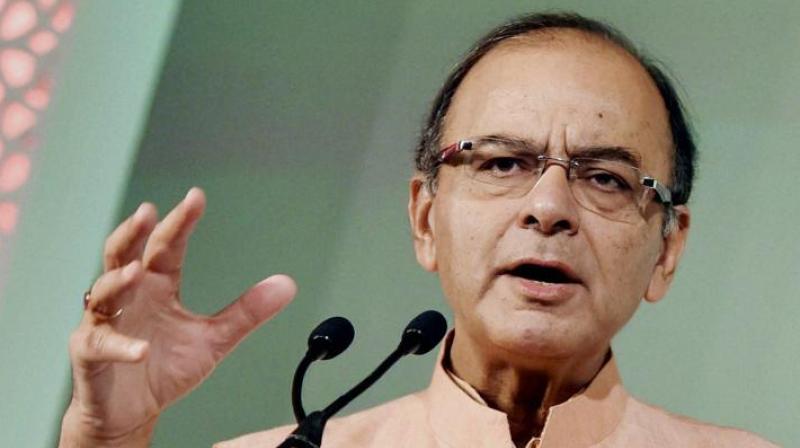Economic Survey lowers GDP growth estimate to 6.5 per cent after note ban
The Survey said that agriculture sector will grow at 4.1 per cent for 2016-17, and industrial sector at 5.2 per cent.

New Delhi: Finance Minister Arun Jaitley on Tuesday tabled the Economic Survey 2017 in Parliament. The presentation of the Survey kick started the Budget session, following President Pranab Mukherjee’s address to a joint session of Parliament.
The Economic Survey predicted GDP growth rate at constant market prices for 2016-17 at 6.5 per cent, down from 7.6 per cent the previous year, following the negative impact of demonetisation.
However, it added that this growth rate would rebound to between 6.75 per cent and 7.5 per cent in 2017-18.
The Survey said that the agriculture sector will grow at 4.1 per cent in the current year up from 1.2 per cent in 2015-16.
Also, the growth rate of the industrial sector is estimated to moderate to 5.2 per cent in 2016-17 from 7.4 per cent in 2015-16.
The Survey lists some of the challenges that might impede India’s progress. These include ambivalence about property rights and the private sector, deficiencies in state capacity, especially in delivering essential services and inefficient redistribution.
The Survey highlights difficulties in privatising public enterprises, even for firms where economists have made strong arguments that they should be in the private sector.
In this context, it pointed towards the need to further privatise civil aviation, banking and fertiliser sectors.
The Survey stated that the capacity of the state in delivering essential services such as health and education is weak due to low capacity, with high levels of corruption, clientelism, rules and red tape.
At the level of states, competitive populism is more in evidence than competitive service delivery, it added.
Constraints to policy making due to strict adherence to rules and abundant caution in bureaucratic decision-making favours status quo, it cautioned.
According to the Survey, redistribution by the government is far from efficient in targeting the poor. This is intrinsic to current programmes because spending is likely to be greatest in states with better institutions and which will therefore have fewer poor.
It noted that over the past two years, the government has made considerable progress towards reducing subsidies, especially related to petroleum products.
Technology has been the main instrument for addressing the leakage problem and the pilots for direct benefit transfer in fertiliser represent a very important new direction in this regard, it said.
Noting that India has come a long way in terms of economic performance and reforms, the survey said there is still a journey ahead to achieve dynamism and social justice and completing this journey will require broader societal shifts in the underlying vision.
The Survey also recommended reforms in labour and tax policies to make the apparel and leather sector globally competitive.
The Economic Survey suggested setting up of a centralised Public Sector Asset Rehabilition Agency, and advocated reforms to ‘unleash economic dynamism and social justice’.
It said that the headline inflation as measured by Consumer Price Index (CPI) remained under control for the third successive financial year
There was a fiscal windfall from Pradhan Mantri Garib Kalyan Yojana, as well as low oil prices, the Survey said.
However, it added that fiscal gains from Goods and Services Tax will take time to realise, since the GST is yet to be rolled out.
India’s trade-GDP ratio is now greater than China’s, the tabled report said.
The Survey revealed that the real Per Capita Gross State Domestic Product (GSDP) between 1983 and 2014 showed ‘remarkable improvement’. The Survey said that during this period, Foreign Direct Investments (FDI) reforms were implemented, allowing India to become one of the world’s largest recipients of FDI.
On demonetisation, the Survey said that the measure has short-term costs but holds the potential for long-term benefits.
Earlier, reports said that the Survey may recommend Universal Basic Income (UBI) that the government may or may not accept and incorporate in key policy decisions.
Government officials were quoted as saying that Survey has proposed to implement UBI through “direct transfers to the bank accounts of the poor to replace subsidy payments and other payouts.”
UBI is a fixed amount of money that residents of a country get on a regular basis.
The Cabinet Committee on Parliamentary Affairs had recommended that the Budget session should commence on January 31 and the Union Budget be presented the next day so that the new financial provisions come into force on April 1, the beginning of the new fiscal year.

